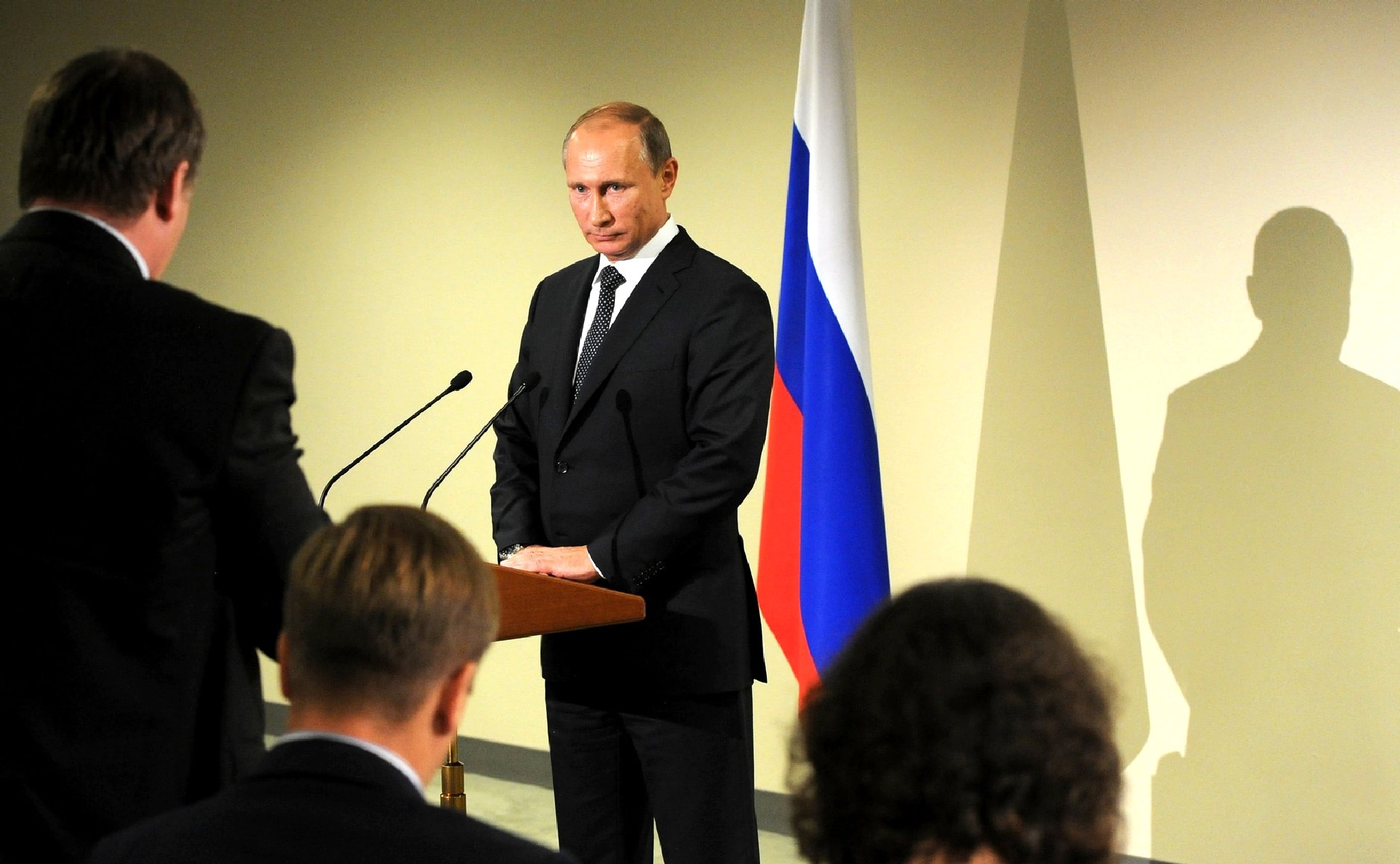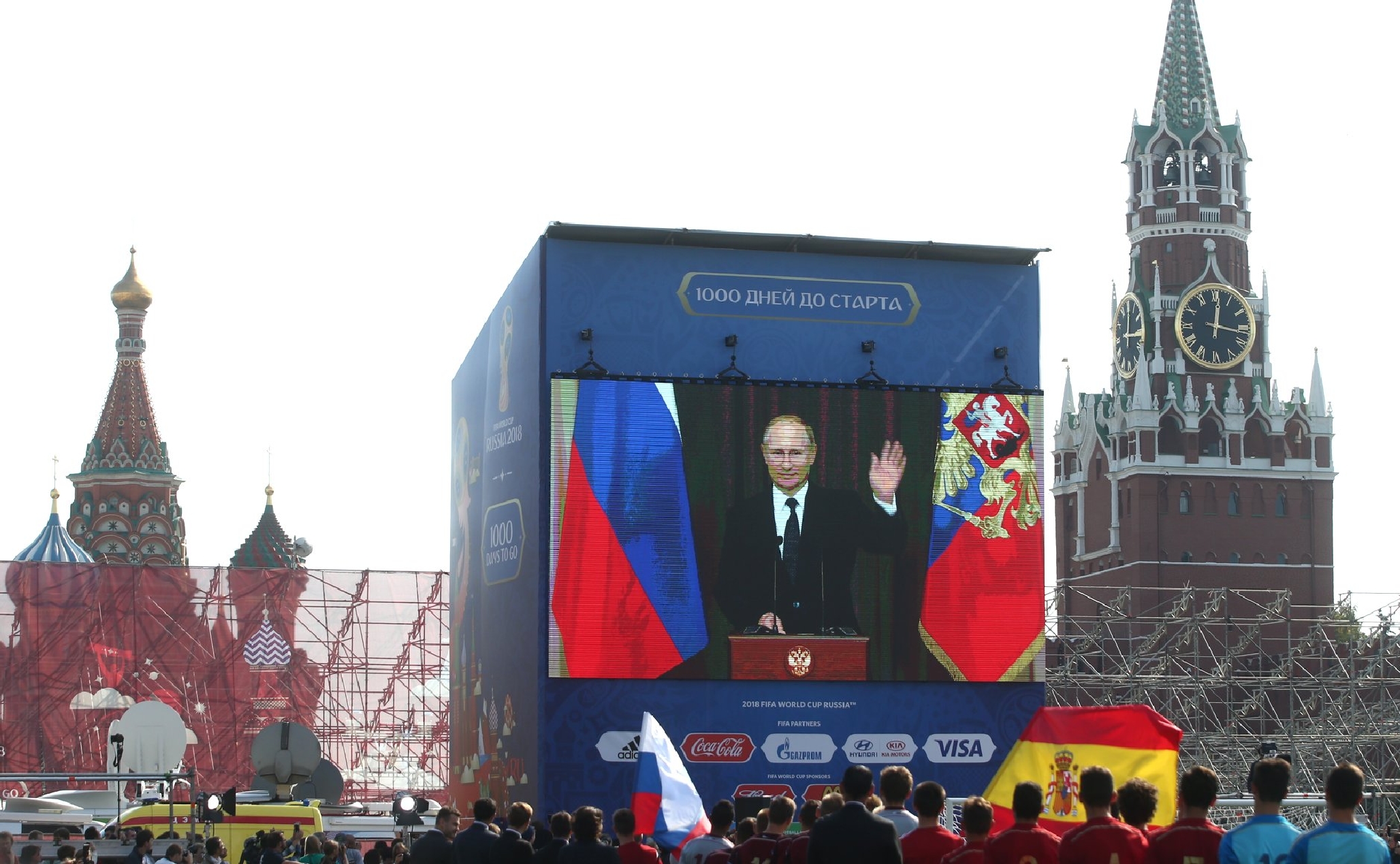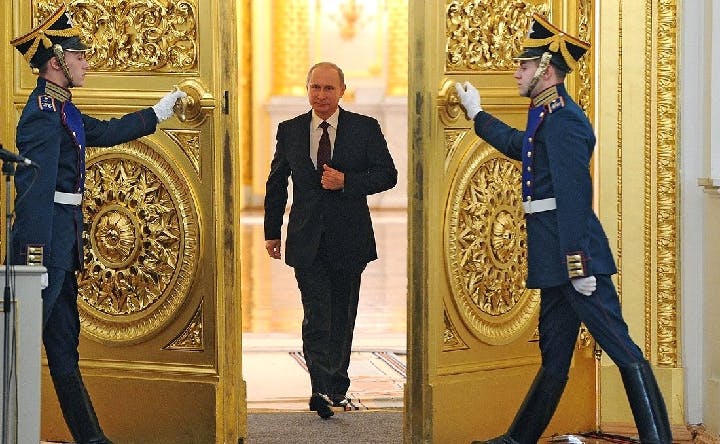Winter 2016
Putin’s hard/soft strategy
– Jill Dougherty
The unpredictability of Vladimir Putin’s “hard” and “soft” sides constantly confound the West, but his approach has an internal logic of its own.
It was one of those media stories about President Vladimir Putin that appear almost daily in Russia: Nikita Gusev, a sculptor in St. Petersburg, had crafted a 150 pound life-sized statue of Putin in chocolate.
“On one hand, the chocolate is soft and malleable,” he told a Reuters reporter. “On the other side, it can be very hard. It is very flexible, it can take any form. I think this material really represents him because he is like that.”
Vladimir Putin’s “hard” and “soft” sides constantly confound the West. When he annexed Crimea in 2014 — an action the West described as undermining the security structure of Europe — he did it with masked, unmarked special forces that he dubbed “polite” people, denying at first they were Russian military, then later openly admitting it.
In September 2015, when he deployed the Russian air force to Syria, he shocked the West, but then promptly invited the United States and the European Union to join hands with him “without any delay” in a “broad coalition” to fight extremists.
This herky-jerky international behavior leads some in the West to call Putin unpredictable at best and unstable at worst. His foreign military operations — including the 2008 war with Georgia, the conflict in eastern Ukraine, and his air campaign in Syria in support of President Bashar al-Assad — have severely undermined both European and American trust in Russia.
Putin’s “hard/soft” strategy can be unpredictable, but it has its own internal logic. His binary approach is a key aspect of his geopolitical ambitions, dictated by a need to both consolidate and preserve power at home while at the same time pursuing a policy of integration with the West — integration, however, on his own terms.
Putin’s “hard/soft” strategy can be unpredictable, but it has its own internal logic.
Domestically, Vladimir Putin continues to build a “Fortress Russia,” nursing grievances, assuring his fellow Russians that they are a civilization apart — superior to the West, and strong enough to withstand any economic pressure imposed from abroad. Russian society is increasingly militarized, with constant references to the glory and valor of czarist Russia and the Soviet Union. Retro Soviet symbols, from red flags to hammer and sickle-adorning knickknacks, seem to be in every gift shop. Putin has even ordered the creation of a modern version of the Soviet Union’s Young Pioneers organization, a way of promoting Russian values.

Beyond Russia’s borders, Putin employs Moscow’s “hard power” thanks to his rebuilt and increasingly competent military, projecting Moscow’s interests and exploiting any hint of indecision or weakness on the part of Western leaders.
As one opinion column in the Kremlin-funded online outlet sputniknews.com put it, “the people of the West — of Europe especially — targeted by jihadi terrorists, have cause to be grateful to the Russian people and government for protecting them from the follies of their own governments.”
But while excoriating the West, the Russian president increasingly says he wants to work with it, even defend it.
In his 2014 address to the Federal Assembly, for example, Putin had the United States in his crosshairs, denouncing a “policy of containment” which, he argued, had been carried out against Russia “for centuries … whenever someone thinks that Russia has become too strong or independent.”
In his 2015 speech, delivered in the midst of his Syrian air campaign, the Russian president once again depicted the U.S. as the main villain in the world, yet refrained from naming it. “We know who decided to oust the unwanted regimes and brutally impose their own rules,” he charged. “Where has this led them? They stirred up trouble, destroyed the countries’ statehood, set people against each other, and then ‘washed their hands,’ as we say in Russia, thus opening the way to radical activists, extremists and terrorists.”
Then a pivot, the “hard” Putin showing his more malleable side. Russia, he said, was “at the forefront” of a titanic battle against terrorism, “a fight for freedom, truth, and justice, for the lives of people, and the future of all civilization.” One country cannot defeat international terrorism alone, he said. “Every civilized country must contribute to the fight against terrorism, reaffirming their solidarity, not in word but in deed.”
Scorning the West while offering to cooperate with it, however, can be a tough balancing act, blurring the lines between enemy and ally. Turkey’s November 2015 shoot-down of a Russian warplane participating in the Syrian air campaign gave President Putin a new, specific enemy against which he could rally the Russian people.
During his December State of the Nation address, Putin lashed out at Turkey and its president: “We will never forget their collusion with terrorists! We have always deemed betrayal the worst and most shameful thing to do, and that will never change. I would like them to remember this — those in Turkey who shot our pilots in the back, those hypocrites who tried to justify their actions and cover up for terrorists.”
Putin’s “emotionality” is not just histrionics.
In a speech usually dedicated to the priorities of the Russian government, the venom was striking. Leonid Isaev, writing in Vedomosti newspaper, drew deeper conclusions from Putin’s tone. “Strained relations with Turkey once again have demonstrated the excessive emotionality of Russia’s external policies,” he wrote, “and its unbalanced character, as a result of which the leadership is becoming more inclined toward making rash decisions, deepening its difficult position.”
Putin’s “emotionality” is not just histrionics. Internationally it may seem over the top, but at home, Putin has molded his foreign policy into a powerful domestic instrument. Looking tough, standing up to the United States, and proving that Russia is a great power on the world stage helps him to consolidate power at home, and emboldens him to take steps that, in some cases, are detrimental to his own people.
In spite of Western sanctions and Russia’s counter-sanctions that deprived Russian consumers of imported cheese, fruits, and vegetables, President Putin’s approval ratings have remained constant at approximately 85 percent. A poll of Russians published by Moscow’s Levada Center in early December 2015 found that 48 percent of respondents said there is no one who could replace Putin as president. Almost a third of Russians polled also agreed with the statement, “our people [Russians] constantly need a strong hand,” and 39 percent agreed that “there are such situations in which, like now, you need to concentrate all power in individual hands.” Just one-fifth of those polled said that power should never be concentrated in the hands of one person.
Even Russia’s isolation — a direct result of Putin’s actions in Ukraine — has not turned Russians against their president. In some ways, the thinking of the average Russian mirrors that of Putin himself.
In some ways, the thinking of the average Russian mirrors that of Putin himself.

Just as Putin assails the West while urging it to join him in an anti-terrorist coalition, 82 percent of Russians, according to a Levada Center focus group, support the annexation of Crimea and, while not opposing improving relations with Europe and the United States, two-thirds of them think Russia should stick to its international policies in spite of Western sanctions.
The West is likely to hear more proposals from President Putin for taking common action with Moscow. In some cases it will be useful, even unavoidable, as in the case of Iran’s nuclear program, and in Syria, where a political transition will be impossible with the efforts of Washington and Moscow.
The West should also be prepared for an assertive Putin to position himself as the catalyst of action, rejecting Western rules of the game. His “hard/soft” strategy relies on an intrinsic tension between cooperation and domination. Vladimir Putin will not take a backseat anymore. If he cannot dominate, he will work to ensure that his Western partners also cannot run the show.
* * *
Jill Dougherty is a former Wilson Center fellow, journalist, and expert on Russia and the former Soviet Union. During her three-decade career with CNN, she served as foreign affairs correspondent, Moscow bureau chief, and White House correspondent. You can follow her on Twitter @jillrussia.
Cover photo courtesy of the Kremlin
